Unit 6 When was it inventedPeriod 2(Section A 3a-3c)课件(共16张PPT)
文档属性
| 名称 | Unit 6 When was it inventedPeriod 2(Section A 3a-3c)课件(共16张PPT) | 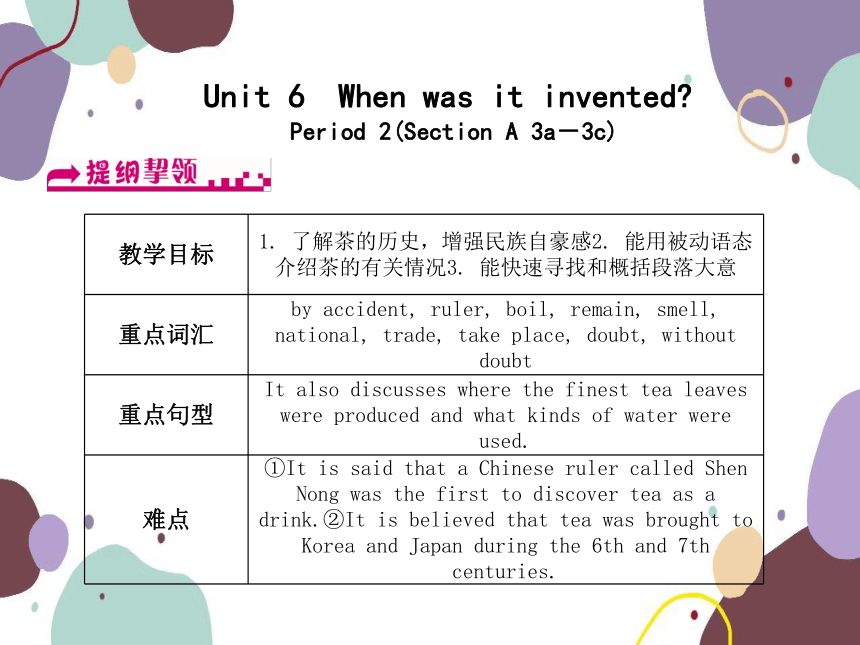 | |
| 格式 | pptx | ||
| 文件大小 | 229.1KB | ||
| 资源类型 | 教案 | ||
| 版本资源 | 人教新目标(Go for it)版 | ||
| 科目 | 英语 | ||
| 更新时间 | 2022-10-19 10:04:58 | ||
图片预览


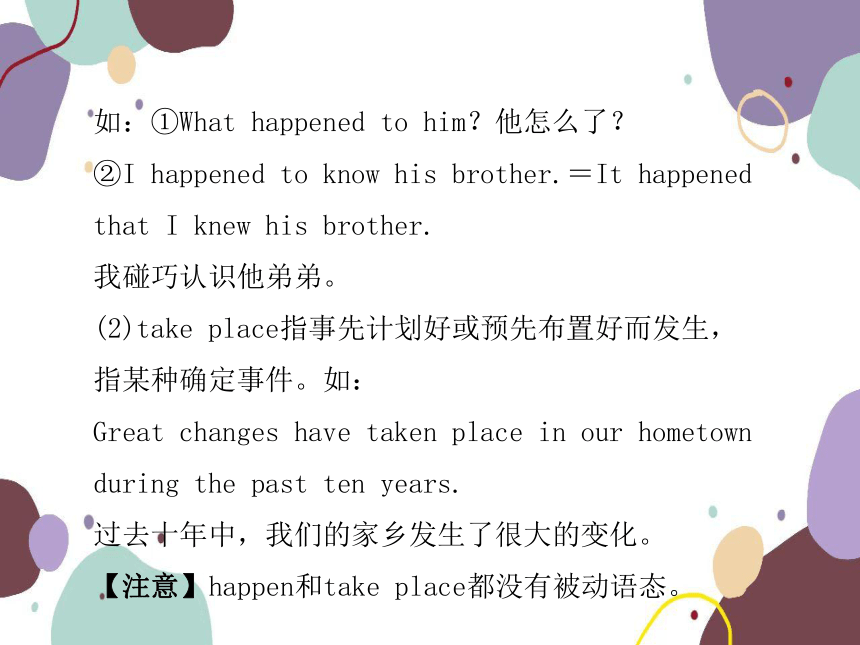
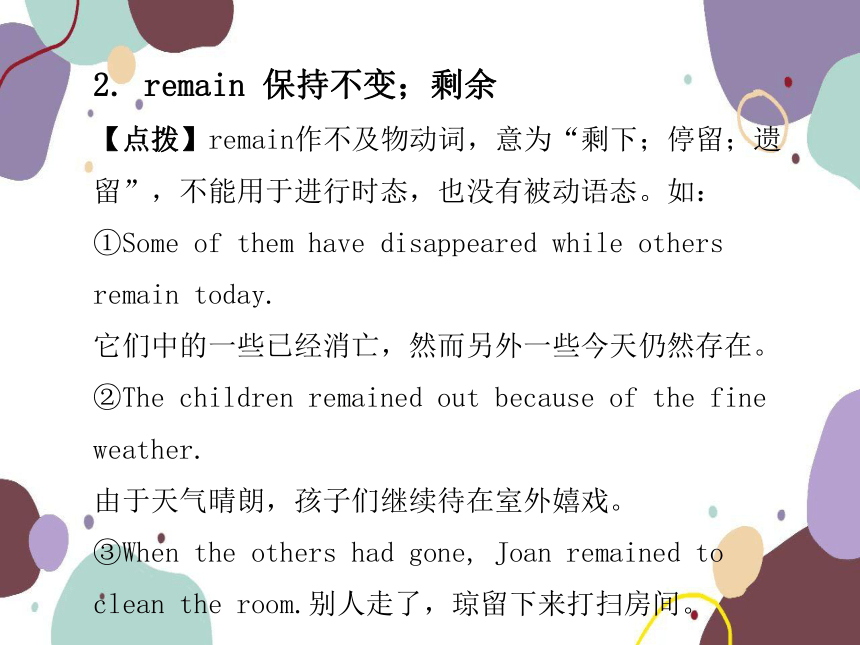

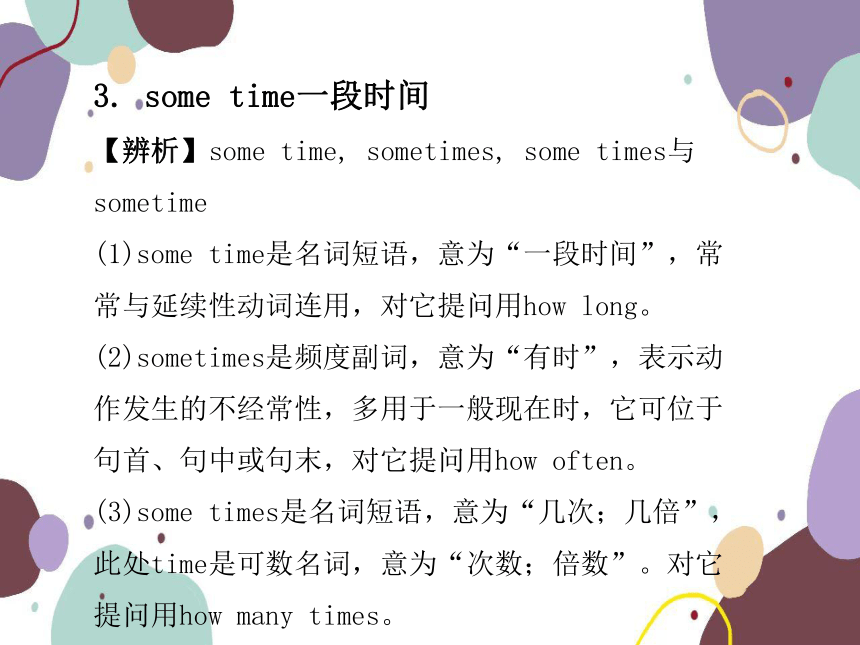
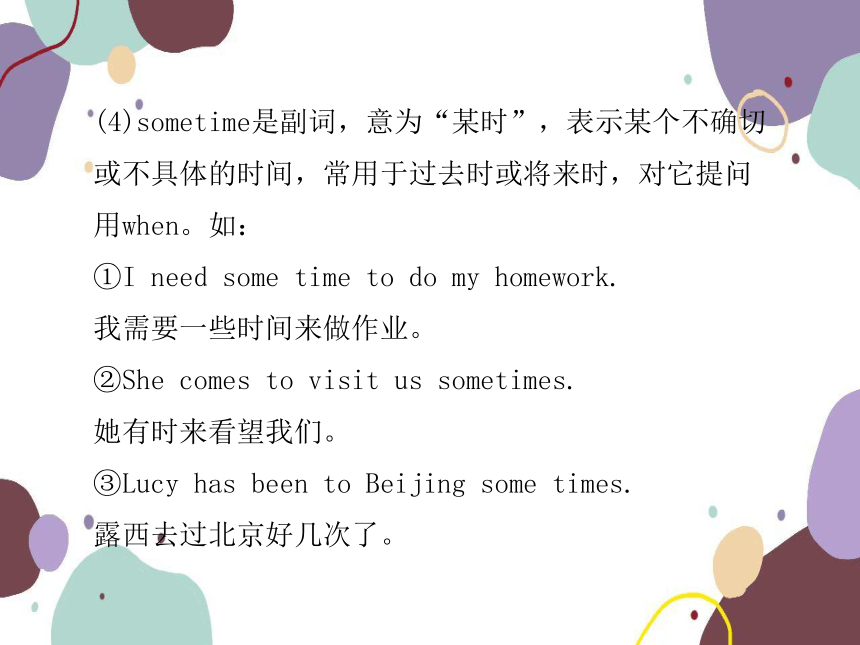
文档简介
(共16张PPT)
Unit 6 When was it invented
Period 2(Section A 3a-3c)
教学目标 1. 了解茶的历史,增强民族自豪感2. 能用被动语态介绍茶的有关情况3. 能快速寻找和概括段落大意
重点词汇 by accident, ruler, boil, remain, smell, national, trade, take place, doubt, without doubt
重点句型 It also discusses where the finest tea leaves were produced and what kinds of water were used.
难点 ①It is said that a Chinese ruler called Shen Nong was the first to discover tea as a drink.②It is believed that tea was brought to Korea and Japan during the 6th and 7th centuries.
1. take place发生;出现
【辨析】happen与take place
两者都意为“发生”,但也有区别。
(1)happen指偶然发生,具有不可预测性,主语一般是某物或某事。表示“某人发生了什么事”用sth. happens to sb.。happen还可以表示“碰巧”,常用于“sb.+happens+to do sth.”和“It happens+that从句”两种结构。
如:①What happened to him?他怎么了?
②I happened to know his brother.=It happened that I knew his brother.
我碰巧认识他弟弟。
(2)take place指事先计划好或预先布置好而发生,指某种确定事件。如:
Great changes have taken place in our hometown during the past ten years.
过去十年中,我们的家乡发生了很大的变化。
【注意】happen和take place都没有被动语态。
2. remain 保持不变;剩余
【点拨】remain作不及物动词,意为“剩下;停留;遗留”,不能用于进行时态,也没有被动语态。如:
①Some of them have disappeared while others remain today.
它们中的一些已经消亡,然而另外一些今天仍然存在。
②The children remained out because of the fine weather.
由于天气晴朗,孩子们继续待在室外嬉戏。
③When the others had gone, Joan remained to clean the room.别人走了,琼留下来打扫房间。
【延伸】remain还可作系动词,意为“保持;仍然是;依旧是”,后接形容词、名词、动词不定式、现在分词、过去分词或介词短语作表语,指某人或某事物仍保持某种状态。如:
①He remained silent.
他保持沉默。(接形容词)
②It remained a secret.
这仍然是个秘密。(接名词)
③Many problems remain to be solved.
有好多问题尚待解决。(接动词不定式)
3. some time一段时间
【辨析】some time, sometimes, some times与sometime
(1)some time是名词短语,意为“一段时间”,常常与延续性动词连用,对它提问用how long。
(2)sometimes是频度副词,意为“有时”,表示动作发生的不经常性,多用于一般现在时,它可位于句首、句中或句末,对它提问用how often。
(3)some times是名词短语,意为“几次;几倍”,此处time是可数名词,意为“次数;倍数”。对它提问用how many times。
(4)sometime是副词,意为“某时”,表示某个不确切或不具体的时间,常用于过去时或将来时,对它提问用when。如:
①I need some time to do my homework.
我需要一些时间来做作业。
②She comes to visit us sometimes.
她有时来看望我们。
③Lucy has been to Beijing some times.
露西去过北京好几次了。
④Jack will leave for America sometime next week.
杰克将在下周某个时间动身去美国。
【助记】some time, sometime, some times与sometimes的用法口诀:
分开“一段时间”(some time),相聚“某个时候”(sometime),分开s是“倍;次”(some times),相聚s是“有时”(sometimes)。
1. Many people believe that tea was first drunk about 5,000 years ago.
许多人认为在大约5 000年前茶首次被饮用。
【点拨】(1)about作副词时,意为“大约;差不多;附近;到处”。如:
①It was a long flight and it took about fourteen hours.
这是一次很长的飞行,大约飞了14小时。
②He looked about, but didn't find his lost book.他四处寻找,但没有找到他丢失的书。
【延伸】about也作介词,意为“关于”。如:
They are talking about a TV play.
他们正在谈论一部电视剧。
(2)ago是副词,意为“……以前”。如:
【点拨】It happened two days ago.
这件事发生在两天前。
【辨析】ago与before
(1)ago指从此刻起,若干时间以前,通常与过去时连用。如:Mr. Zhang went to Beijing a week ago.
一周前张先生去了北京。
(2)before指从过去某时起的若干时间以前,通常与完成时、过去时等连用;还可用作前置词或连接词表时间,而ago则不能这样用。如:
①He said that he had seen her two days before.
他说他两天前见到过她。(表示从他说话那时的两天前)
②I've seen that film before.
我以前看过那部电影。
2. It is believed that tea was brought to Korea and Japan during the 6th and 7th centuries.
人们认为茶叶是在公元6到7世纪期间被传入韩国和日本的。
【点拨】(1)It is believed that... 相当于People believe that...,意为“人们认为……”,其中it为形式主语,真正的主语是that引导的从句。类似的句型还有:It is said that... 据说……;It is reported that... 据报道……;
It is supposed/thought that...人们认为……;It's known that... 众所周知……。如:
①It is believed that it is well worth seeing.
人们认为它是很值得看的。
②It is said that they have won the game.
据说他们赢得了那场比赛。
【点拨】(2)during the 6th and 7th centuries意为“在公元6到7世纪期间”,其中century作名词,意为“世纪;百年”。in the+序数词+century表示“在某世纪”。如:I think advertising was highly developed in the twentieth century.
我认为广告是在20世纪高度发展的。
【延伸】“in the+年代+of+the+序数词+century”或“in the+年份+s”表示“在某世纪某一年代”。如:He was born in the nineties of the twentieth century.=He was born in the 1990s.
他出生于20世纪90年代。
3. In England, tea didn't appear until around 1660. 在英国,茶叶直到大约1660年才出现。
【点拨】not...until...意为“直到……才……”,主句的动词一般是非延续性动词,它所表示的动作直到until所表示的时间才发生。until可作介词,其后接表示时间的名词;也可作连词,引导时间状语从句。
如:
①She can't leave until Friday.
直到星期五她才能离开。
②I hadn't realized the thing was serious until she told me about it.
直到她告诉我,我才意识到这件事的严重性。
Unit 6 When was it invented
Period 2(Section A 3a-3c)
教学目标 1. 了解茶的历史,增强民族自豪感2. 能用被动语态介绍茶的有关情况3. 能快速寻找和概括段落大意
重点词汇 by accident, ruler, boil, remain, smell, national, trade, take place, doubt, without doubt
重点句型 It also discusses where the finest tea leaves were produced and what kinds of water were used.
难点 ①It is said that a Chinese ruler called Shen Nong was the first to discover tea as a drink.②It is believed that tea was brought to Korea and Japan during the 6th and 7th centuries.
1. take place发生;出现
【辨析】happen与take place
两者都意为“发生”,但也有区别。
(1)happen指偶然发生,具有不可预测性,主语一般是某物或某事。表示“某人发生了什么事”用sth. happens to sb.。happen还可以表示“碰巧”,常用于“sb.+happens+to do sth.”和“It happens+that从句”两种结构。
如:①What happened to him?他怎么了?
②I happened to know his brother.=It happened that I knew his brother.
我碰巧认识他弟弟。
(2)take place指事先计划好或预先布置好而发生,指某种确定事件。如:
Great changes have taken place in our hometown during the past ten years.
过去十年中,我们的家乡发生了很大的变化。
【注意】happen和take place都没有被动语态。
2. remain 保持不变;剩余
【点拨】remain作不及物动词,意为“剩下;停留;遗留”,不能用于进行时态,也没有被动语态。如:
①Some of them have disappeared while others remain today.
它们中的一些已经消亡,然而另外一些今天仍然存在。
②The children remained out because of the fine weather.
由于天气晴朗,孩子们继续待在室外嬉戏。
③When the others had gone, Joan remained to clean the room.别人走了,琼留下来打扫房间。
【延伸】remain还可作系动词,意为“保持;仍然是;依旧是”,后接形容词、名词、动词不定式、现在分词、过去分词或介词短语作表语,指某人或某事物仍保持某种状态。如:
①He remained silent.
他保持沉默。(接形容词)
②It remained a secret.
这仍然是个秘密。(接名词)
③Many problems remain to be solved.
有好多问题尚待解决。(接动词不定式)
3. some time一段时间
【辨析】some time, sometimes, some times与sometime
(1)some time是名词短语,意为“一段时间”,常常与延续性动词连用,对它提问用how long。
(2)sometimes是频度副词,意为“有时”,表示动作发生的不经常性,多用于一般现在时,它可位于句首、句中或句末,对它提问用how often。
(3)some times是名词短语,意为“几次;几倍”,此处time是可数名词,意为“次数;倍数”。对它提问用how many times。
(4)sometime是副词,意为“某时”,表示某个不确切或不具体的时间,常用于过去时或将来时,对它提问用when。如:
①I need some time to do my homework.
我需要一些时间来做作业。
②She comes to visit us sometimes.
她有时来看望我们。
③Lucy has been to Beijing some times.
露西去过北京好几次了。
④Jack will leave for America sometime next week.
杰克将在下周某个时间动身去美国。
【助记】some time, sometime, some times与sometimes的用法口诀:
分开“一段时间”(some time),相聚“某个时候”(sometime),分开s是“倍;次”(some times),相聚s是“有时”(sometimes)。
1. Many people believe that tea was first drunk about 5,000 years ago.
许多人认为在大约5 000年前茶首次被饮用。
【点拨】(1)about作副词时,意为“大约;差不多;附近;到处”。如:
①It was a long flight and it took about fourteen hours.
这是一次很长的飞行,大约飞了14小时。
②He looked about, but didn't find his lost book.他四处寻找,但没有找到他丢失的书。
【延伸】about也作介词,意为“关于”。如:
They are talking about a TV play.
他们正在谈论一部电视剧。
(2)ago是副词,意为“……以前”。如:
【点拨】It happened two days ago.
这件事发生在两天前。
【辨析】ago与before
(1)ago指从此刻起,若干时间以前,通常与过去时连用。如:Mr. Zhang went to Beijing a week ago.
一周前张先生去了北京。
(2)before指从过去某时起的若干时间以前,通常与完成时、过去时等连用;还可用作前置词或连接词表时间,而ago则不能这样用。如:
①He said that he had seen her two days before.
他说他两天前见到过她。(表示从他说话那时的两天前)
②I've seen that film before.
我以前看过那部电影。
2. It is believed that tea was brought to Korea and Japan during the 6th and 7th centuries.
人们认为茶叶是在公元6到7世纪期间被传入韩国和日本的。
【点拨】(1)It is believed that... 相当于People believe that...,意为“人们认为……”,其中it为形式主语,真正的主语是that引导的从句。类似的句型还有:It is said that... 据说……;It is reported that... 据报道……;
It is supposed/thought that...人们认为……;It's known that... 众所周知……。如:
①It is believed that it is well worth seeing.
人们认为它是很值得看的。
②It is said that they have won the game.
据说他们赢得了那场比赛。
【点拨】(2)during the 6th and 7th centuries意为“在公元6到7世纪期间”,其中century作名词,意为“世纪;百年”。in the+序数词+century表示“在某世纪”。如:I think advertising was highly developed in the twentieth century.
我认为广告是在20世纪高度发展的。
【延伸】“in the+年代+of+the+序数词+century”或“in the+年份+s”表示“在某世纪某一年代”。如:He was born in the nineties of the twentieth century.=He was born in the 1990s.
他出生于20世纪90年代。
3. In England, tea didn't appear until around 1660. 在英国,茶叶直到大约1660年才出现。
【点拨】not...until...意为“直到……才……”,主句的动词一般是非延续性动词,它所表示的动作直到until所表示的时间才发生。until可作介词,其后接表示时间的名词;也可作连词,引导时间状语从句。
如:
①She can't leave until Friday.
直到星期五她才能离开。
②I hadn't realized the thing was serious until she told me about it.
直到她告诉我,我才意识到这件事的严重性。
同课章节目录
- Unit 1 How can we become good learners.
- Section A
- Section B
- Unit 2 I think that mooncakes are delicious!
- Section A
- Section B
- Unit 3 Could you please tell me where the restroom
- Section A
- Section B
- Unit 4 I used to be afraid of the dark.
- Section A
- Section B
- Unit 5 What are the shirts made of?
- Section A
- Section B
- Review of Units 1-5
- Unit 6 When was it invented?
- Section A
- Section B
- Unit 7 Teenagers should be allowed to choose their
- Section A
- Section B
- Unit 8 It must belong to Carla.
- Section A
- Section B
- Unit 9 I like music that I can dance to.
- Section A
- Section B
- Unit 10 You're supposed to shake hands.
- Section A
- Section B
- Review of Units 6-10
- Unit 11 Sad movies make me cry.
- Section A
- Section B
- Unit 12 Life is full of the unexpected
- Section A
- Section B
- Unit 13 We're trying to save the earth!
- Section A
- Section B
- Unit 14 I remember meeting all of you in Grade 7.
- Section A
- Section B
- Review of Units 11-14
